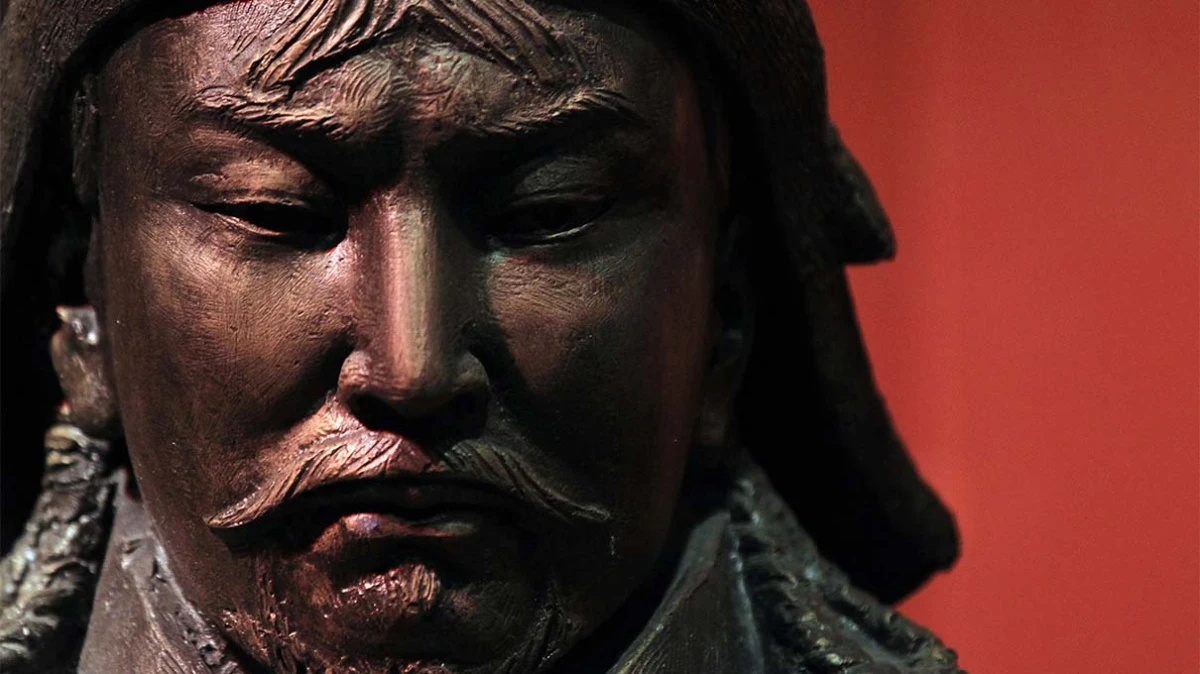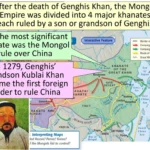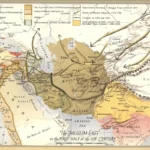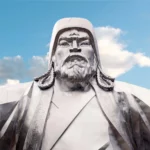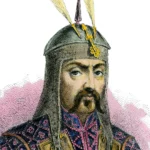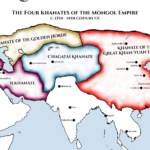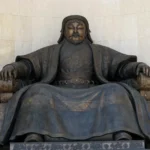Genghis Khan, a name that evokes both awe and fear, was a legendary warrior who left an unforgettable mark on history. Join us as we journey through the thrilling tale of his life, conquests, and empire. From his humble beginnings as a nomadic chieftain to his rise as the founder of the mighty Mongol Empire, Genghis Khan’s story is a testament to leadership, strategy, and the relentless pursuit of power. We’ll delve into the secrets of his military prowess and the lasting impact he had on the world, shaping the course of nations and leaving a legacy that would reverberate for centuries to come.
Genghis Khan’s Legacy: A Tale of Conquest, Culture, and Controversy
Picture this: Genghis Khan, a fierce Mongol warrior, charging across the vast terrain, uniting nomadic tribes into a mighty army. His military prowess was unmatched, his strategic mind sharp, and his determination unwavering.
The Mastermind of Warfare
Genghis Khan forever transformed warfare. He saw the potential in uniting the nomadic tribes and turning them into a disciplined fighting force. His cavalry became a lightning-fast army, their mobility and ferocity unmatched. He devised tactics that would be studied for centuries: swift attacks, calculated retreats, and a relentless pursuit of victory.
Empire Builder Extraordinaire
His military victories led to the creation of the Mongol Empire, a colossal domain stretching from the Pacific to Eastern Europe. It was a network that connected the East and West, enabling the exchange of goods, ideas, and technologies. It fostered a vibrant exchange of knowledge and culture, contributing to the flourishing of civilizations across Eurasia.
Cultural Catalyst
Beyond his military brilliance, Genghis Khan had a profound cultural influence. He embraced tolerance and religious freedom, allowing his conquered peoples to practice their beliefs. He also saw the value in adopting advanced technologies from the civilizations he encountered, such as gunpowder and the printing press. These innovations contributed to the progress of humanity.
A Legacy of Complexity
The Genghis Khan legacy is a multifaceted one. He was a skilled military strategist, a ruthless conqueror, and a visionary leader. His empire, though short-lived, had lasting effects on civilizations from China to Europe. His military tactics, cultural influence, and economic innovations continue to fascinate and inspire today, reminding us of the power of human ambition and the fragility of empires.
Pros and Cons of Genghis Khan’s Reign:
Pros:
- United nomadic tribes into a formidable force
- Facilitated trade and cultural exchange across Eurasia
- Promoted tolerance and religious freedom
- Adopted and disseminated advanced technologies
Cons:
- Ruthless military campaigns and conquests
- Destruction and displacement of populations
- Short-lived empire leading to political instability
- Legacy of fear and controversy
- Dive deeper into the fascinating life and conquests of the legendary warrior in Genghis Khan biography.
- Explore the pivotal events that shaped the rise and fall of the vast Mongol Empire in Genghis Khan history.
- Delve into the innovative strategies and tactics that enabled Genghis Khan empire to become one of the largest contiguous empires in history.
- Uncover the secrets of Genghis Khan’s unparalleled military prowess in Genghis Khan military tactics.
Conquests and Military Strategies: How Genghis Khan Built an Empire
Imagine the thunder of thousands of horses, the earth shaking beneath them, as the Mongol warriors charged across the plains. It was Genghis Khan’s military brilliance that enabled his empire to conquer vast territories, leaving a lasting legacy that still influences the world today.
Swift as Lightning: The Mongol Cavalry
The Mongols’ secret weapon lay in their exceptional mobility. Their horses were renowned for their speed and endurance, allowing the riders to cover great distances quickly. This mobility gave them an edge over their adversaries, enabling them to raid settlements, launch surprise attacks, and retreat before their enemies could react effectively.
Adaptable and Agile: The Mongol Tactics
The Mongols didn’t rely solely on speed and strength. They were highly adaptable and adjusted their tactics based on the situation. They could charge with devastating force, rain down arrows to soften up defenses, or even pretend to retreat, luring enemies into an ambush. This versatility made them unpredictable and formidable foes.
United and Disciplined: The Mongol Army
Behind the military prowess of Genghis Khan was a well-disciplined army. Soldiers were fiercely loyal to their leader and fought as one unit, guided by a shared purpose. This unity and discipline gave them a significant advantage on the battlefield.
Innovation and Learning: Embracing New Knowledge
The Mongols were not afraid to adopt new technologies and strategies from their conquered foes. They introduced advanced siege machinery, mastered the use of gunpowder, and absorbed valuable military knowledge from conquered civilizations. This openness to innovation contributed to their continued success.
The Impact of Military Brilliance: The Mongol Empire
The military prowess of Genghis Khan shaped the fate of the Mongol Empire. It enabled him to conquer and control an immense territory, uniting tribes and creating a powerful global force. The Mongol Empire became a cornerstone of history, its legacy still evident in the present.
The Mongol Empire: Administration
As the mighty Mongol Empire grew under the rule of the legendary Genghis Khan, it became clear that a strong administrative system was needed to govern its vast territories and diverse populations. Genghis Khan, known for his brilliance in warfare, proved equally adept in creating a government that would last for centuries.
The Pillars of Administration
1. Meritocratic Leadership:
Genghis Khan believed in rewarding talent and loyalty. Leaders, from generals to administrators, were chosen based on their abilities, not their birthright. This meritocratic approach ensured that the most capable individuals rose to positions of influence, fostering a sense of unity and loyalty among the Mongol ranks.
2. The Yassa: The Code of Law
To maintain order and discipline across the vast empire, Genghis Khan established a comprehensive code of laws known as the Yassa. This code covered everything from daily conduct to military regulations and legal procedures. By enforcing the Yassa, the Mongols created a society where everyone knew their place and expected consequences for breaking the rules.
3. Centralized Power with Advisors:
At the helm of the Mongol Empire sat the Khan, who exercised supreme authority over all matters. However, the Khan was not alone in making decisions. He was aided by a council of advisors, composed of trusted generals, administrators, and religious leaders. These advisors provided valuable insights and counsel, helping the Khan to make informed choices for the empire.
Additional Features
While the Mongol Empire’s administrative system lacked the formal departmental structure seen in later empires, it did have several notable features:
- Provincial Governors: The empire was divided into provinces, each governed by a governor appointed by the Khan. These governors were responsible for maintaining law and order, collecting taxes, and administering justice.
- Communication Network: The Mongols established a sophisticated network of roads and postal services to facilitate communication across the vast empire. This network allowed for quick dispatch of orders, news, and supplies, ensuring that the government could respond effectively to challenges.
- Religious Tolerance: Genghis Khan recognized the importance of religious tolerance in maintaining harmony within the diverse population of his empire. He allowed his subjects to practice their own religions without persecution, creating an environment where different faiths coexisted peacefully.
Culture: The Legacy of Genghis Khan
Genghis Khan, the legendary conqueror, left a lasting impact on cultural landscapes, shaping a vibrant interplay of tradition and modernity.
Traditional Roots and Nomadic Heritage:
Despite his military prowess, Genghis Khan cherished the nomadic heritage of his people. He preserved time-honored customs like horse races, where riders pushed their steeds to the limit, and wrestling matches that showcased the strength and agility of the Mongols. Archery, a vital hunting skill, remained an integral part of their cultural identity.
Religious Harmony and Openness:
Genghis Khan’s reign was characterized by remarkable religious tolerance. He granted freedom of worship to conquered peoples, embracing a diversity of beliefs. Scholars, artisans, and traders from far-flung regions were welcomed into the Mongol fold, creating a vibrant melting pot of cultures. This openness fostered intellectual exchange, cross-fertilization of ideas, and the adoption of new technologies.
Assimilation and Innovation:
The Mongol conquest served as a conduit for cultural exchange. Skilled craftsmen and experts from vanquished territories were integrated into Mongol society, bringing with them their knowledge and skills. This facilitated advancements in architecture, medicine, and astronomy, enriching the cultural fabric of the empire. New ideas and technologies were assimilated, leading to a dynamic cultural landscape where tradition and innovation intertwined.
Key Points to Ponder:
- Genghis Khan’s legacy preserved Mongol traditions while fostering cultural exchange through conquest.
- Religious tolerance and openness to diverse perspectives enriched the Mongol civilization.
- The Mongol conquest facilitated the integration of new technologies and ideas, fostering cultural progress.
It’s worth noting that the impact of Genghis Khan’s cultural legacy is still felt today, as Mongolian traditions continue to be celebrated and preserved, while the empire’s influence on world history remains a fascinating topic of study.
FAQ
Q1: What were the key factors that contributed to Genghis Khan’s military success?
A1: Genghis Khan’s military prowess was the result of his exceptional equestrianism, agile tactics, discipline and unity, and willingness to adopt superior technologies from his enemies.
Q2: How did Genghis Khan impact the political landscape of Asia?
A2: Genghis Khan’s vast conquests shaped the political landscape of Asia, creating the largest contiguous empire in history. His empire spanned from Poland to Vietnam, and from Syria to Korea.
Q3: What was the significance of Genghis Khan’s establishment of a government for the Mongol Empire?
A3: Genghis Khan’s establishment of a powerful and efficient government for the Mongol Empire promoted fairness and loyalty through meritocracy, maintained order through the Yassa, and ensured the empire’s effectiveness through military and political councilors.
Q4: How did Genghis Khan’s religious tolerance contribute to the legacy of the Mongol Empire?
A4: Genghis Khan’s tolerance towards various religions, including Islam, Christianity, Buddhism, and Daoism, fostered diversity and cultural exchange within the Mongol Empire. This tolerance played a role in the empire’s stability and longevity.
Q5: What is Genghis Khan’s enduring legacy?
A5: Genghis Khan’s legacy lies in the profound impact he had on world history. His conquests shaped the political and cultural landscape of Asia, and his empire became a symbol of military prowess and efficient governance. His legacy continues to be studied and admired for its achievements.
- Mastering Leader in Spanish: The Complete Guide - April 19, 2025
- Uncovering Surprising Parallels: England Size Compared to US States - April 19, 2025
- Old Mexico Map: Border Shifts 1821-1857 - April 19, 2025
